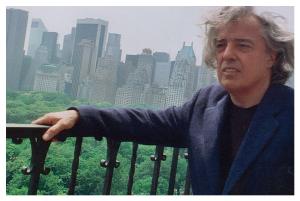Photograph: Jean-Pierre Dalbéra via Flickr
The term ‘kitsch’ is quite recent. In essence, it refers to material objects that exhibit poor taste: kitsch art is necessarily cheap, sentimental, and tacky. It’s a concept that Jeff Koons does well.
That’s not to say that Koons’ work is in bad taste, though many believe it is. In 2014, an exhibition review in The Guardian of ‘Jeff Koons: Retrospective’ commented on the art’s ability to generate ‘an agreeable queasiness’. Koons draws criticism, too, for the presentation of women in some of his work. Indeed, the same reviewer commented on the ‘cheap, tone-deaf’ misogyny of his ‘Made in Heaven’ series (1989-91)). This comment springs to mind when one looks at the use of the female body in his 'Banality' series — Pink Panther (1988), for example, or Fait D’Hiver (1988). If not misogynistic, then 'Made In Heaven' still evokes a theme running through much of Koons’ art – that of commodification, or consumerism. ‘Made in Heaven‘ is a series depicting Koons making love with his ex-wife Ilona Staller. Staller is a porn star, amongst other occupations. In the context of Koons’ other work, it is difficult not to see ‘Made in Heaven’ as a commentary on the commodification of sex in the porn industry and other venues.
In some of his other work, such as the early series ‘The New’ (1979-83), the critical examination of consumerism is clearer. ‘The New’ depicts brand new vacuum cleaners encased in plexiglass and lit by fluorescent lights. It immediately raises one question: is this art? Perhaps that’s what Koons is trying to provoke. His work exploits popular art to redefine ‘high culture’, and to challenge what is and isn’t art. His work isn’t about representation so much as re-presentation. He presents objects of modern materialistic life outside of their domestic setting, against the white walls of a gallery. In essence, he commodifies consumerism. As one of Koons’s early works, the series has attracted much attention in light of more recent projects. It has become a pinnacle of Koons’ work, to highlight the overwhelming presence of materialism in all areas of society— including high art itself.
Koons might present commentaries about consumerism, but he cannot escape the self-conscious consumerism that surrounds his art. Some of his most well-known achievements have been monetary. Selling for $58.4 million, for example, his sculpture Balloon Dog (1994-2000) became the most expensive artwork ever sold by a living artist. Felix Salmon wrote last year about Koons’ ability to turn money into art. As well as highlighting Koons’ perfectionism, Salmon also drew attention to the expense of his work. He has bankrupted several art dealers, as well as losing enormous amounts of money himself. He is not afraid to ask investors for more money to complete his projects – they are expensive to run, often containing multiple editions of one piece and employing a number of people to help carry out his artistic duties. He’s been called ‘the smooth salesman of surrealism’ by Edward Helmore, not just reflected in the cost of his art: his retrospective exhibition at the Whitney in New York in 2014 set attendance records by the time it closed.
Kitsch art will always attract as much criticism as it does appreciation. For some, it is tacky—indeed, it takes a certain eye to see refined art in Michael Jackson and Bubbles (1988). For others, it is clever. Koons is, indeed, intelligent about his art. It is gaudy; it certainly isn’t ideal for display in the average living room. But like all good art, it communicates an underlying narrative about social issues. For Koons, one of those social issues is materialism, and the self-conscious nature of his art highlights this by becoming an example of it.
Originally published on The Global Panorama. Edits from original are my own.








